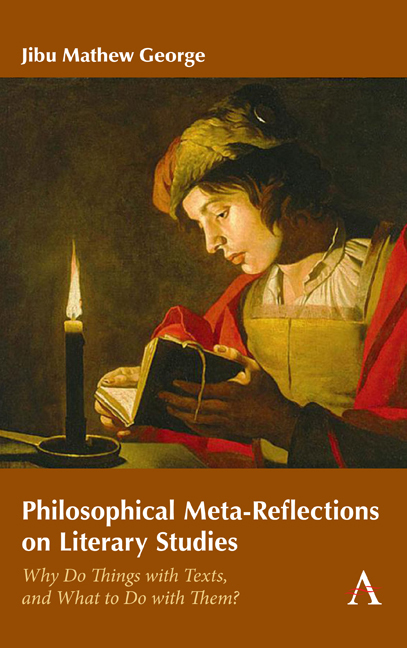 Philosophical Meta-Reflections on Literary Studies
Philosophical Meta-Reflections on Literary Studies Book contents
- Frontmatter
- Dedication
- Content
- Acknowledgements
- Introduction
- 1 The Why and Wherefore of Academic Disciplines: The Humanities and the Human World Process
- 2 If Literature were to Disappear from the Spectrum of Disciplines …
- 3 Beyond for and Against: Tendencies of Contemporary Criticism
- 4 The Aesthetic and the Political
- References
- Index
1 - The Why and Wherefore of Academic Disciplines: The Humanities and the Human World Process
Published online by Cambridge University Press: 11 December 2019
- Frontmatter
- Dedication
- Content
- Acknowledgements
- Introduction
- 1 The Why and Wherefore of Academic Disciplines: The Humanities and the Human World Process
- 2 If Literature were to Disappear from the Spectrum of Disciplines …
- 3 Beyond for and Against: Tendencies of Contemporary Criticism
- 4 The Aesthetic and the Political
- References
- Index
Summary
The Humanities – An Ugly Duckling among Alma Mater's Pets
One principle dominates contemporary deliberations on curriculum planning and development in higher education: ‘social relevance’. The one reason given for poor research funding in the humanities is that its results are not immediate. What is not immediate is purportedly irrelevant! At least in Hans Christian Anderson's tale, the ugly duckling eventually reveals itself to be a swan. We are not claiming that the true identity of the humanities will be revealed only in future though this chapter contains a sort of blue print for their expansion. Nor are we saying that we should divert all the funding from stem cell studies and cancer drug research to knowledge generation in the humanities. Ours is not a plea for pre-eminence of the humanities or a plea against any other discipline or set of disciplines, say STEM (science, technology, engineering and mathematics). This is not a plea at all. No discipline needs a defence against any other discipline. As demonstrated with the later discussion of ideological criticism in Chapter 3, polemical or contestational reasoning is a necessary but insufficient phase of reasoning in the humanities. But every discipline needs to articulate a rationale for its existence. The title of this section, therefore, is not a summary but a point of departure.
Though in a very different context, some acknowledgements of limitations, or calls for such an acknowledgement, have come from within the humanities. Several years ago, philosopher (or ‘post-philosopher’) Richard Rorty proposed a modest conversational theory of knowledge. According to him, philosophy was a form of cultured conversation, not an attempted revelation of the truth of the world. Apparently, there is very less at stake here. Rorty was of the view that philosophers should give up the ambition or pretension to describe the world. As the title of his book Philosophy and the Mirror of Nature suggests, ideas do not provide a mirror of the way the world is but have consequences. The philosopher is not a ‘cultural overseer who knows everyone's common ground’ and who offers an explanatory master discourse but an ‘informed dilettante’ who sees ‘relations between various discourses as those strands in a possible conversation’ (1990, 316– 17). Rorty's was a response to what he called the ‘self-obsessed, “in-grown”, and “over-philosophized” ‘ character which the humanities had attained in the 1980s.
- Type
- Chapter
- Information
- Philosophical Meta-Reflections on Literary StudiesWhy Do Things with Texts, and What to Do with Them?, pp. 5 - 28Publisher: Anthem PressPrint publication year: 2019
